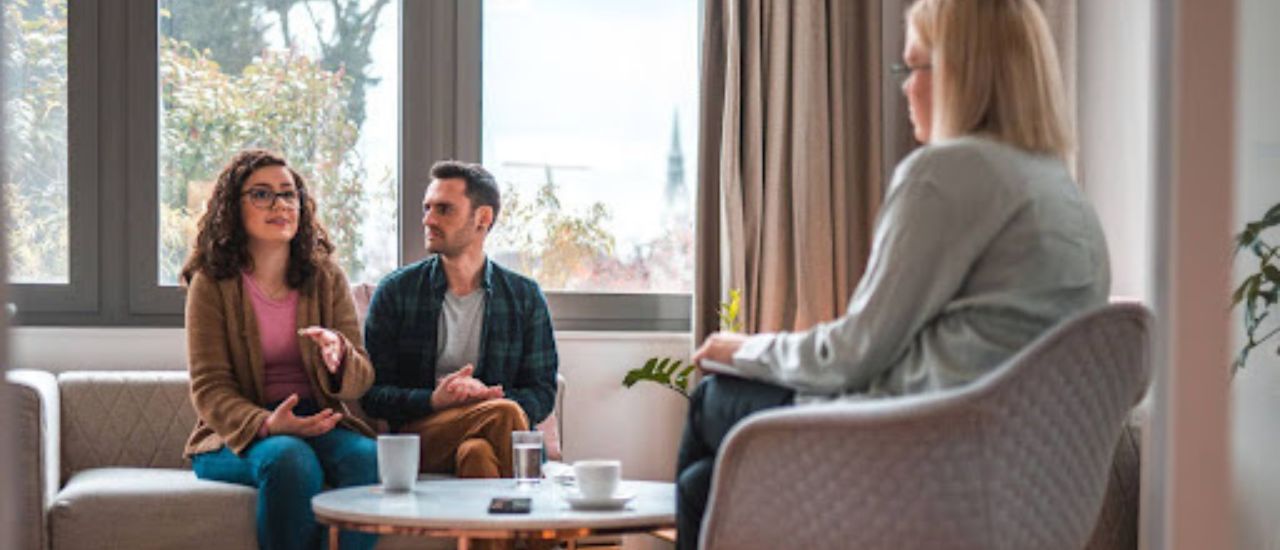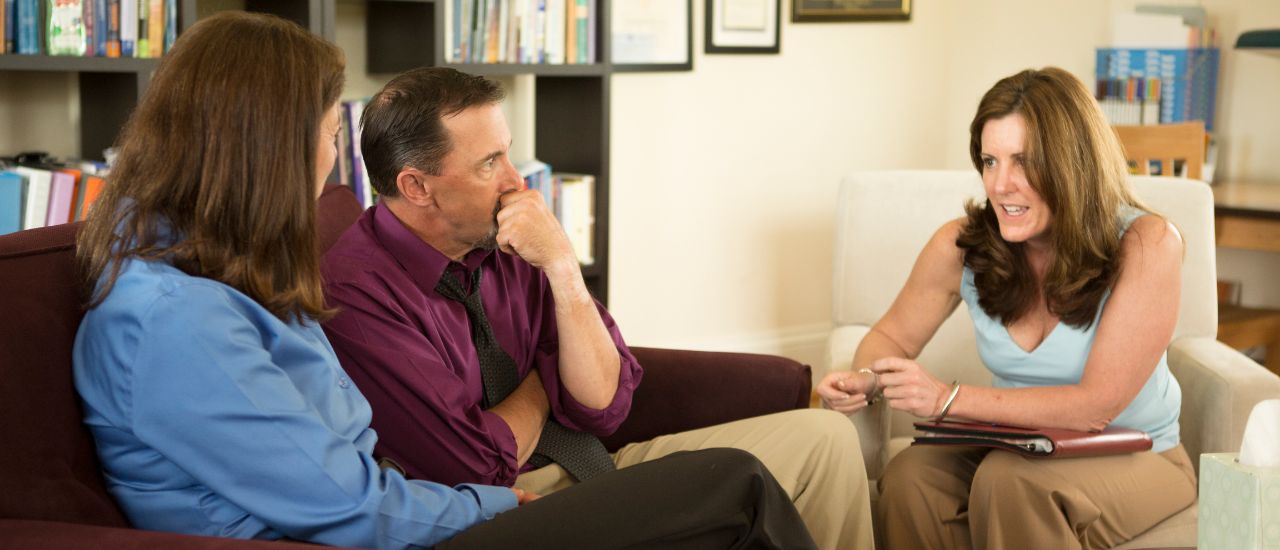
How Couple Therapy Can Help Navigate Financial Crises
In the tumultuous journey of life, couples invariably encounter challenges that test the resilience of their relationships. These challenges place them at a crossroads where seeking professional guidance becomes not just an option but a necessity. This blog delves into the pivotal role of couple therapy, with a special focus on how it can serve as a beacon of hope during financial turmoil.
In times of crisis, turning to a seasoned relationship counselor can be the lifeline that not only salvages a relationship but also propels it towards a trajectory of profound growth and resilience.
The Role of Couple Therapy and the Benefits of Seeing a Relationship Therapist
Relationships, akin to intricate ecosystems, demand continual attention and nurturing. The initial euphoria of love can wane, replaced by the stark realities of life, such as financial struggles, which can cast a shadow over the once-bright connection between partners. It is crucial to recognize the inevitability of tension and discord in any relationship, but equally important to address these issues before they fester into destructive patterns. Life is too short to dwell in perpetual dissatisfaction, and seeking professional help represents a proactive step toward reclaiming happiness with a partner.
The Role of Couple Therapy
Recognizing the need for couple therapy is a subjective process, as every relationship is unique. Contrary to the misconception that therapy is a last resort, it can be a proactive step even for couples who are still in the honeymoon phase. Early intervention allows couples to learn effective strategies for sharing space, and time, and resolving conflicts creatively. For those who have weathered decades of frustration, therapy can offer a fresh perspective, breaking entrenched patterns and paving the way for positive change.
Couple therapy, often referred to as marriage counseling, emerges as a potent tool to navigate the multifaceted challenges that can threaten the stability of a relationship. It provides a safe space where couples can unravel their concerns, fears, and aspirations. A skilled relationship therapist, or marriage therapist, acts as a guide, leading couples through a process of resolution, helping them rediscover effective communication, rebuild trust, and realign their shared goals.
The Benefits of Seeing a Relationship Therapist
Couple therapy is not merely a crisis management tool; it is a journey of self-discovery and growth for both individuals and the relationship as a whole. The couple therapist provides valuable insights, fostering a deeper understanding of each partner’s needs and desires. By addressing underlying issues and teaching effective communication, therapy empowers couples to build a resilient foundation for their future.
Furthermore, couple therapy acts as a preventive measure, helping couples identify and address potential issues before they escalate. Through skill-building exercises and guided discussions, couples learn to anticipate and manage challenges, fostering a proactive approach to relationship maintenance.
Financial Crises and Couple Therapy
One of the most formidable challenges that couples often face is navigating financial crises. Money matters can be a substantial source of stress, leading to tension, arguments, and a communication breakdown. In these situations, couples need the necessary tools to manage financial challenges as a team, fostering cooperation rather than contention.
Financial crises are a common source of strain in relationships, often exacerbated by differing attitudes toward money. Couple therapy provides a structured and supportive environment where partners can explore their individual beliefs and values related to finances. Through open and guided conversations, couples gain insights into each other’s financial perspectives, laying the groundwork for a more collaborative approach to money management.
Couples also develop practical strategies for navigating financial challenges. From creating realistic budgets to setting financial goals, therapy becomes a forum for constructive planning and shared decision-making. This not only addresses immediate financial concerns but also equips couples with the skills to face future financial hurdles together.
Enjoy a Thriving Relationship with Couple Therapy
In the intricate tapestry of relationships, financial crises can be a formidable challenge. However, seeking the guidance of a skilled couple therapist can transform this challenge into an opportunity for profound growth and renewal. By addressing issues head-on, couples can navigate the complexities of financial stress and emerge not only stronger but more deeply connected, better equipped to face future challenges.
Remember, life is a journey best shared, and couple therapy serves as a compass that can guide you back to the path of happiness with the one you love. In embracing the transformative power of therapy, couples not only weather the storms but also discover a renewed sense of purpose, intimacy, and shared joy. As the saying goes, “In every crisis, there is an opportunity,” and couple therapy can be the key to unlocking that opportunity for a fulfilling and enduring relationship.
Reach out to us today.
Learn More
Rediscovering Love Through Couple Therapy
Love is a complex and beautiful aspect of human existence. It has the power to bring joy, connection, and fulfillment to our lives. However, maintaining a healthy and loving relationship can be challenging.
Over time, couples may find themselves facing a variety of issues that strain their bond. In such instances, the transformative power of couple therapy can play a crucial role in rediscovering love and revitalizing relationships.
Enhancing Communication
One of the key benefits of couple counseling is improved communication. Effective communication is the cornerstone of a healthy relationship.
However, many couples struggle to express their needs, desires, and concerns in a constructive manner. Couple therapy provides a structured setting where couples can learn and practice effective communication skills. Couples therapists facilitate open dialogue, encourage active listening, and teach couples how to express themselves assertively without resorting to hostility or defensiveness.
These improved communication skills foster a deeper understanding and create a foundation for reconnection.
Uncovering Underlying Dynamics
Another important aspect of couple therapy is the exploration of underlying emotional patterns and dynamics. Each individual brings their own unique history, experiences, and beliefs into a relationship.
These factors can significantly impact how couples relate to one another and handle conflicts. Couple therapy helps uncover these underlying patterns and provides an opportunity for individuals to gain insight into their own behaviors and reactions. This self-awareness enables couples to challenge negative patterns and adopt healthier ways of relating.
By understanding themselves and their partners better, couples can create a more compassionate and supportive environment for growth and healing.
Healing Past Wounds
Couple therapy also offers a space for couples to address unresolved issues and heal past wounds. Over time, resentment, hurt, and unmet expectations can accumulate, creating a barrier to intimacy and love.
Therapy allows couples to openly discuss their concerns, express their emotions, and work towards resolving lingering conflicts. With the guidance of a skilled therapist, couples can learn forgiveness, let go of grudges, and develop a renewed sense of empathy and understanding.
By addressing these unresolved issues, couples can release the emotional burdens that have been weighing them down and open themselves to a deeper connection.
Prevention and Relationship Strengthening
In addition to addressing existing challenges, couple therapy can also serve as a preventive measure. Many couples seek therapy before problems escalate, as a means of enhancing their relationship and building a stronger foundation.
Engaging in regular check-ins and addressing minor issues before they escalate into major conflicts can proactively strengthen the bond and create a healthier future together.
Couple therapy provides a space for couples to learn valuable relationship skills, cultivate resilience, and invest in the long-term success of their partnership.
Cultivating Intimacy and Emotional Connection
Building and nurturing intimacy and emotional connection are also essential aspects of a fulfilling relationship. Through couple therapy, couples can actively cultivate and strengthen these vital components.
Creating a Safe Space for Vulnerability
In the supportive and non-judgmental environment of couple therapy, partners can freely express their deepest fears, desires, and vulnerabilities. This safe space encourages open communication and fosters a deeper emotional connection between partners.
Rebuilding Trust
Trust forms the foundation of a healthy relationship. Past hurts or breaches of faith can also erode it. Couple therapy provides a structured framework for rebuilding trust. With the guidance of a therapist, couples can address and heal from past wounds, learn transparency, and implement strategies to rebuild trust and create a stronger foundation.
Enhancing Emotional Intimacy
Emotional intimacy goes beyond physical closeness. It involves a deep understanding of each other’s emotions, needs, and vulnerabilities. Through couple therapy, partners can develop emotional intelligence and empathy.
Therapists facilitate exercises and techniques that promote emotional connection, such as active listening, validation, and empathy-building exercises. These practices foster a deeper sense of closeness and connection.
Exploring Love Languages and Attachment Styles
Every individual has unique ways of expressing and receiving love. Couple therapy provides a space for partners to explore and understand their love languages and attachment styles.
By discovering and appreciating these differences, couples can learn to meet each other’s emotional needs more effectively, fostering a stronger emotional bond and deeper connection.
Rediscovering Passion and Intimacy
Over time, the spark of passion can fade in a relationship. Couple therapy offers guidance on reigniting passion and nurturing physical intimacy. Therapists address issues surrounding sexual intimacy, help partners overcome obstacles, and provide strategies to revive and sustain a fulfilling physical connection.
Embracing the Transformative Journey
In conclusion, couple therapy, with the guidance of a skilled therapist like Tom Caplan, has the potential to rekindle the flames of love and transform struggling relationships. Through enhanced communication, exploration of underlying dynamics, healing of past wounds, and preventive measures, couples can embark on a transformative journey of cultivating intimacy and emotional connection.
The path may not always be easy, but the rewards of a healthier,and more fulfilling relationship are undoubtedly worth the effort. If you and your partner are facing challenges in your relationship, consider seeking help and assistance from Tom Caplan, a professional therapist in the field of couple therapy. With his expertise and your willingness to grow, you can rediscover the love that brought you together and create a future filled with happiness and fulfillment.
Learn More
The Power of Couples Counseling and Family Therapy
Relationships help create a holistic part of our lives, bringing us love, joy, and fulfillment. However, they can also present challenges and obstacles that test our commitment and resilience. During these trying times, couples counseling and family therapy can be powerful tools to help navigate the complexities of relationships. With the assistance of a skilled marriage and family therapist, individuals can learn to rebuild trust, enhance communication, heal from trauma, strengthen blended families, and nurture parent-child connections.
In this article, we will explore the benefits of couple and family therapy, shedding light on the transformative power these therapeutic approaches hold.
The Advantages of Couples Counseling and Family Therapy
Couples counseling and family therapy offer a multitude of benefits for individuals and families facing relationship challenges. These therapeutic approaches provide a safe and supportive environment where couples and families can address issues, rebuild trust, and improve communication. Through the guidance of a skilled therapist, individuals can heal from trauma, navigate blended family dynamics, and enhance parent-child connections.
In the following sections, we delve into the numerous benefits that couples counseling and family therapy offer.
Rebuilding Trust: Restoring Intimacy in Relationships
Trust forms the foundation of any successful relationship, be it between partners or within a family unit. However, when our trust is broken, whether due to betrayal, or other circumstances, it can deeply wound the relationship. Couples counseling and family therapy provide a safe and supportive environment for individuals to address these trust issues. With the guidance of a skilled therapist, couples can embark on a journey of rebuilding trust.
Through open and honest dialogue, they can express their concerns, fears, and expectations, fostering a path towards healing and ultimately restoring intimacy within the relationship.
Effective Communication
Communication is often referred to as one of the most crucial aspects of a healthy relationship. Yet, miscommunication and misunderstandings are common pitfalls that can potentially lead to conflict and disconnection. Couples counseling and family therapy offer valuable tools and techniques to enhance communication skills.
Therapists help individuals learn active listening, assertiveness, and conflict resolution strategies, enabling them to express their needs and feelings effectively. By improving communication, couples and families can break down barriers, foster empathy, and create a space for understanding, which paves the way for lasting connection and harmony.
Healing from Trauma
Traumatic experiences, such as loss, abuse, or significant life changes, can profoundly impact individuals and their relationships. Couples counseling and family therapy provide a supportive environment for healing from these traumas as a unit. A skilled therapist can guide families in processing their emotions, addressing unresolved issues, and developing coping mechanisms.
By working through trauma together, families can find solace, strength, and resilience. Throughout this therapeutic process, they can rebuild their lives, redefine their relationships, and grow stronger as a family.
Strengthening Blended Families:
Blended families, formed when partners with children from previous relationships come together, face unique challenges in merging their lives and establishing harmonious dynamics. Couples counseling and family therapy can play a vital role in strengthening these families. By facilitating open dialogue and understanding between all family members, therapists can help navigate the complexities of blending households, parenting styles, and differing expectations.
With the help and guidance of a skilled therapist, blended families can feel a sense of togetherness, mutual respect, and love, which forges a solid foundation for a successful future together.
Enhancing Parent-Child Connections
The relationship between a child and their parent is one of the most significant connections in a person’s life. However, challenges such as generational gaps, differing perspectives, and communication breakdowns can strain these bonds. Family therapy provides a nurturing space for parents and children to explore their relationship dynamics, strengthen their connection, and foster understanding.
A skilled therapist can offer insights into child development, parenting strategies, and effective communication techniques. By strengthening this sacred connection between a parent and their child, families are able to build a strong bond based on trust, support, and unconditional love, which helps in the creation of having a lasting impact on the well-being and future of a child.
The Transformative Impact of Couples Counseling and Family Therapy
Couples counseling and family therapy offer transformative opportunities for individuals and families to navigate the complexities of relationships. With the assistance of a skilled marriage and family therapist, couples can rebuild trust, enhance communication, heal from trauma, strengthen blended families, and nurture parent-child connections. These therapeutic approaches empower individuals to overcome challenges, grow together, and create fulfilling and harmonious relationships.
If you are seeking support for your relationship or family, consider the power of couples counseling and family therapy as a catalyst for positive change. Contact Tom Caplan, a dedicated family and couple therapist based in Montreal, and embark on a transformative journey towards healthier connections today. Take the first step towards a happier and more fulfilling family life by scheduling your session with Tom Caplan now!
Learn More
Rebuilding Connections: Marriage Counseling Montreal Tips
Marriage is a bond that demands constant attention and care to thrive. It’s common for couples to experience phases of disconnection, conflict, and stress, leading to a strained relationship. If you find yourself in this situation, don’t despair. There are steps you can take to rebuild your connection and strengthen your bond.
In this article, we’ll explore some marriage-counseling tips that can help you and your partner get back on track.
Communication: Hear and Say
An essential aspect of a healthy marriage is effective communication. It requires both partners to listen and speak openly and honestly with each other. If you’re having trouble communicating, try these tips:
Hear attentively
When your partner is speaking, pay full attention. Avoid interrupting or jumping to conclusions. Instead, try to understand their perspective and feelings.
Say your truth
When it’s your turn to talk, express yourself clearly and respectfully. Avoid blaming or attacking your partner. Instead, focus on your own experience and needs.
Check for understanding
After each of you has spoken, take a moment to summarize what you heard. This can help prevent misunderstandings and show your partner that you’re listening.
Respect: Show Gratitude
Another vital element of a healthy marriage is mutual respect. It means treating each other with kindness, consideration, and gratitude. If you want to show your partner that you value them, try these tips:
Express appreciation & show affection
Take the time to acknowledge and thank your partner for the things they do for you. This can be as simple as saying “thank you” or leaving a note of appreciation.
Physical touch and affection can help strengthen your bond. Try hugging, holding hands, or kissing your partner more often.
Avoid criticism
Criticism and contempt can damage your relationship. Instead, try to focus on what you appreciate about your partner and their actions.
Compromise: Collaborate
Marriage requires compromise and collaboration. It means finding ways to work together and solve problems as a team. If you’re struggling to find common ground, you can try to work on the following:
Identify shared goals & brainstorm solutions
Talk to your partner about what you both want for your relationship and your future. This can help you find common ground and a sense of purpose.
When you encounter a problem, work together to find solutions that work for both of you. Be willing to make compromises and consider each other’s perspectives.
Take turns
Sometimes, one partner may need to compromise more than the other. Try to take turns being the one who makes the bigger sacrifice.
Patience: Take it Steady
Rebuilding a connection takes time and patience. Don’t expect overnight miracles or quick fixes. Instead, try to approach your relationship with a sense of calm and persistence. If you find it difficult to be patient, here’s what you can do:
Manage your expectations
Be realistic about what you can achieve in a given timeframe. Don’t put too much pressure on yourself or your partner.
Celebrate progress
When you make progress, no matter how small, take time to celebrate it. This can help motivate you to keep going.
Practice self-care
Taking care of yourself can help you stay patient and resilient. Make time for activities that bring you joy and relaxation.
Time: Make Space for Each Other
A strong marriage needs regular care and nurturing.
Schedule quality time & Reconnect with shared activities & avoid distractions
Set aside regular time to spend together, such as date nights. Try to find activities that you both enjoy and make time to do them together. This can help you feel closer and more connected.
When you’re spending time together, try to minimize distractions. Minimizing distractions when spending time with your significant other can help you communicate better, build a stronger connection, show respect, and reduce stress. It’s an important way to prioritize your relationship and show your partner that they are important to you.
Professional Help: Get Advice
Sometimes, no matter how hard we try, we can’t seem to work through our problems on our own. That’s where a therapist or counselor can be incredibly helpful. These trained professionals can provide a safe and non-judgmental space for you to explore your thoughts and feelings, and they can offer guidance and support as you navigate difficult situations.
Tom Caplan is a therapist that specializes in relationship counseling. He is a licensed clinical social worker and psychotherapist who has been working with couples and families, for over 30 years. He uses a variety of approaches, including cognitive-behavioral therapy, mindfulness, and family systems therapy, to help his clients improve their communication and strengthen their relationships.
If you’re struggling in your relationship, don’t be afraid to seek help from a professional. A therapist or counselor can help you identify patterns of behavior that may be contributing to the problem, and they can offer strategies to resolve conflicts and build a stronger bond with your partner.
Conclusion: Strengthen the Bond
Relationships can be challenging, but with patience, communication, and a willingness to work together, they can also be incredibly rewarding. Remember to make time for your partner, to listen actively and empathetically, and to practice self-care, so that you can be your best self for your relationship. And if you’re struggling, don’t be afraid to seek help from a professional. With their guidance and support, you can learn new skills and strategies for strengthening your bond with your partner, and building a more fulfilling life together.
If you are struggling in your marriage and are feeling stuck, it’s important to know that you don’t have to go through it alone. Tom Caplan is a marriage counselor, and offers couples marriage counseling therapy to help you and your partner work through your issues, and build a stronger, healthier relationship.
Through personalized couple counseling sessions, Tom Caplan can help you identify the root causes of your issues and develop effective strategies for communication, conflict resolution, and intimacy building. With his guidance, you and your partner can learn to rebuild trust, deepen your connection, and achieve the happy, fulfilling marriage you both deserve.
Don’t let fear, pride, or shame hold you back. Reach out to Tom Caplan today, and take the first step towards a happier, healthier marriage with couples therapy.
Learn More
How Do I Prepare For My First Couple Counseling Session?
If you are here, it means you care deeply about your relationship and want the best for it. It is a subtle but strong acknowledgment that your relationship could be better with a little external help. It is also an indication that you are reaching out to ask for help.
Remember, couple counseling is not only necessary when you are going through a rough patch in your relationship. It can also be used to rekindle dying embers or to strengthen certain aspects of your relationship. If your first-ever couple counseling session is imminent, then read on to learn about certain preparations you can make to get the most out of the session.
Check to see if there are any prerequisites for the session
Therapists will usually have varying prerequisites for couple counseling sessions. While you prepare for your first session, it is vital that you be aware of the existence of any prerequisites so that you can meet them in good time. Usually, a counselor will send you a text to confirm or remind you about the session, while some will require you to fill out some forms before you start the session. Learning about and meeting these prerequisites will ensure that you don’t waste any time when you walk in for the session.
Define your general pain points
If you have decided to see a counselor, then there are likely problems that you are suffering from. They may be general concerns, but most of the time they will be issues that are unique to your partnership. These form the basis of your pain points for which you will be seeking help from the therapist. Therefore, before walking into the very first session, it is important that you define the general pain points that you would like the therapist to help you deal with. It may take a couple of counseling sessions for the therapist to fully figure out your specific concerns and main reasons for the counseling. Please note that this is something that may keep evolving following the subsequent sessions.
Define the boundaries or the limits that must be respected
Couple therapy will always be unique and there is no single template that can be used for every couple. Since reasons for seeking the sessions are different, and the dynamics of a relationship vary, you should define the boundaries that you wish to be respected throughout the session. It is not only you who will have such boundaries; the counselors will also have limits that they will expect you to respect throughout the counseling sessions. For example, as a couple, you may agree that you are not going to be specific about past partners such as ex-boyfriends or ex-girlfriends. For a variety of reasons, some partners may find such topics to be emotive and may want to steer away from them during sessions.
The counselor, on the other hand, may have limits such as no violence or raising one’s voice during the sessions. If these limits are not respected, the counselor may decide to terminate the treatment immediately.
Be ready to do some work between sessions
It is highly likely that you will be attending more than one counseling session. After the first session, don’t just expect to wait blindly for the next appointment. Some therapists love to give couples some kind of “homework” for them to do before they come in for the next appointment. Others, on the other hand, won’t give any homework, but something for the couple to think about as a summary of the session.
Confirm the mode of payment
It is important that you also understand the modes of payment accepted by your counselor. The last thing you want is to have everything ready for the session only to discover at the very last minute that you don’t have a mode of payment acceptable to the clinic. The easiest way to do this is to simply call your counselor and ask what forms of payment they accept. This is also the time to ask for the specific fees, and to inquire about the session length so that you have an accurate idea of what you will be walking into once the session starts.
Have an open mind toward the counselor’s approach
There are numerous strategies or counseling techniques that Montreal therapists can use to help couples. While planning for your first session, it is important that you understand that a therapist may choose to use any tool in their arsenal based on your specific case and circumstances. This calls for you to have an open mind so that you are receptive to the approach since it is what they believe will work best in your case.
For example, a therapist like Dr. Tom Caplan uses Needs ABC: Needs acquisition and behavior change for most of the couple’s counseling sessions. This approach uses integrated therapeutic methodologies combined with the observation and elucidation of client processes with the aid of motivational, emotion-focused, narrative-focused, and cognitive-behavioral models.
You don’t have to understand in detail the method used by the therapist, but just have an open mind as a couple, and be receptive to whatever recommendations they may throw your way.
Learn More
What Is Couples Therapy Like?
If you and your significant other are experiencing ongoing conflict, and it is undermining the health of your relationship, it may be time to consider couples therapy. Couples therapy may seem like a dramatic solution to resolving conflict in a relationship, but in fact it is a common and effective one. When you decide to go to couples therapy, you are making a positive statement about your relationship: that it is an vital part of your life, and one worth optimizing. In short, signing up for couples therapy is proof of commitment. As one who has never experienced this type of therapy before, however, you may have questions as to what it is really like. Let’s explore what couples therapy is, and how it can help you.
What Is Couples Therapy?
Couples therapy is a form of psychotherapy concerned with helping couples navigate challenges in their relationship by allowing them to better understand the nature of their relationship, and how they can find healthier ways of relating to one another.
Typical challenges faced include communication problems, sexual issues, or a seemingly imminent breakup. By using particular therapeutic techniques and interventions related to the couple’s goals, challenging aspects of the relationships can be addressed and improved. As human beings, we are prone to becoming stuck in unhealthy patterns that we blindly adhere to. With the help of couples therapy, a couple can identify these damaging patterns and work towards breaking them.
What Happens at Couples Therapy?
During couples therapy, couples will discuss perceived challenges in their relationship. Because a couples therapist acts as a neutral party, he or she is able to offer an objective opinion, and one backed by extensive psychological training and experience. When couples discuss these very same issues privately, it is all but impossible to manage an objective and reasonable stance since the conversation is saturated with, and influenced by, emotion. A therapist will ask pertinent questions to help partners communicate in a healthier and more level-headed manner. In this way, couples can better understand each other’s perspectives and approach an issue from a new angle.
Oftentimes, desires are expressed in a critical way that leaves a partner hurt, angry, and defensive. In couples therapy, partners are encouraged to frame desires in a constructive way. Additionally, a couples therapist will teach partners to communicate in a way that prevents the other from shutting down emotionally.
Finally, if psychological factors such as depression are present in one or both partners, and this is creating conflict in the relationship, a couples therapist is qualified to identify and help remedy such issues.
Conclusion
In life, the connections we make with others is of paramount importance. The relationship we share with our partners is precious and worth preserving, and optimizing, at all costs. If you are experiencing conflict in your relationship, why wait until matters are beyond repair? Do yourself a favor and consider couples therapy.
Learn More
Most Common Questions Asked During Couples Counseling
Here are some of the most common questions that are asked during couples counseling. What’s wrong with your relationship? What’s still working? – Ask a relationship therapist. Schedule your appointment online now.
When you and your partner begin your relationship counseling journey, you will discover that collaboration between you and your partner is necessary to improve your relationship. As long as both parties are open to sharing and accepting counseling, this process of exploration can be very rewarding, and will help your relationship succeed. While couples therapy is rarely routine, those who have experienced it have come across a variety of valuable questions posed by their therapists, who have had a positive impact on their respective relationships.
Do you think you’re happy? How does your level of joy affect your relationship?
Happiness is a contradictory concept. Perhaps you assume that since you are comfortable with your partner, and are able to describe certain wants or needs, and can even share certain intimate stories that lead to positive emotions. However, it is essential to ask yourself whether or not you are really happy with the person. It is also important that your partner answers the same question, regarding whether they are fully happy with you. In many cases, two people are together simply because they want to feel safe, secure, and comfortable; not because they are happy. The question must be asked, because often, the most encouraging results that couples counseling in Montreal can provide, is to accept that it is better to let something go when it no longer works, than to waste time in a relationship you and your partner are not determined to save, work on, and thrive in.
What are your relationship predictions for the present and the future?
Overall damage and conflict within a relationship vary considerably from couple to couple, and a therapist must understand the extent of the repairs required, before the couple can be on a level playing field again. One way a couple can think about their relationship, is either as a sunny day, a partially cloudy day, a heavily cloudy day, or a stormy day. Once the therapist has determined the severity of the damage, he or she can then begin to isolate some of the factors that contribute to the overall “weather.” An equally important question to ask is: what are your projections for the future? If either or both partners foresee failure, an assessment and further consideration of the need to repair the relationship is required. If the expected result is encouraging, this is very good news for the pair.
What brought you together in the first place?
When couples are caught up in resentment and conflict, it can be hard to remember why they even got together in the first place. The farther away they are from this feeling of happiness and friendliness, the easier it is to justify breaking up the relationship, which is a problem if the couple wants to stay together and love each other. To help restore some of that desire, it is necessary for the couple to go back and think about why they decided to start a relationship with each other, and about some of the things they like about each other. If they can make a list, it will help show the other person that there was love once, and that it still exists. If very little comes to mind, however, the couple may have to consider how they wish to proceed and whether the relationship is worth saving.
What more do you want your partner to do?
This is a great question because it allows both partners to express their wishes, while helping the other partner realize that they may not have been as loving or caring as they should have been. When these types of needs or desires are expressed outside the session, it may be perceived as needy, clingy or, in the case of a dispute, simply anger. However, when these needs and desires are presented in a safe, non-judgmental space, partners may see that their partner’s needs are not being met and a problem arises. It can also help the couple set goals by trying to implement these needs in their daily lives.
Common Questions
The most common questions in premarital counseling focus on expectations for the marriage. Topics include: the roles you will each play in the family, raising children, your finances, and which direction you are headed in life. Some of the most common questions you may be asked by a relationship therapist in Montreal or in pre-marital couples counseling are:
Why do you want to get married?
What do you both want in your lives?
Where do you think you’ll be in ten or twenty years, or beyond?
How would you describe yourself? Are you a supportive partner?
Do you have a history of substance abuse?
Do you want to have children? How soon? How many?
This is not an exhaustive list of the topics and questions you will encounter in couples therapy or premarital couples counseling, but it does provide a good idea of what you can expect. These questions are a great starting point for couples therapy or couples counseling, as they cover many different aspects of conjugal life.
Learn More
Benefits of Relationship Therapists for Marriage
In the case that challenges have been encountered within the couple, knowing how to orient oneself, is fundamental to obtaining positive results.
Depending on the nature of the personal and/or interpersonal difficulties that one may experience within the couple, the approach to marriage help may vary.
Topics covered:
- Definition of couples therapy
- Possible approaches to couples therapy
- When & whom to consult
Tom Caplan provides an update.
What Is Couples Therapy?
Couples Therapy is a therapeutic approach to relational therapy (between a therapist and the couple – or spouses taken separately). It aims to establish (or restore) healthier, balanced, and stable functioning, within the couple.
Personality or value judgments will be put aside. Each member of the couple, will need to become aware of their own mindset, habits and patterns, in order to implement actions that will lead to a more satisfactory relationship.
Different approaches and therapies exist. The ultimate goal is to obtain a better understanding of each partner, as well as to improve and open up communication, and to determine any compromises that may need to be made.
The therapist will nearly act as an unbiased witness to the couple.
Finally, couples therapy is different from sex therapy (or sexual therapy), as well as marriage counseling. It provides an essential and broad approach to married life or to long-term relationships outside of marriage. Initially, time will largely be invested into understanding each individual, and the issues at hand, prior to discussing details such as the couple’s sex life.
For example, each member of the couple will disclose their professional life, availability, attitudes towards family members, whether the couple participates in leisure activities, and certain critical items relating to their children, if applicable.
Why Couples Therapy?
The reasons for seeking couples therapy may differ for each person within the couple. However, if one or both members of the couple are suffering, it is recommended that you consult a professional.
Why, you ask?
Any form of psychological and/or emotional suffering that persists over the course of time requires outside help.
Each member of the couple may also be accompanied by certain serious symptoms (depression, addiction, etc.). Couple problems, or crises within the couple, are inevitable and “normal”. Although it is less common, couples therapy can even be used preventatively, to maintain and improve relationships, communication, and mental health!
Oftentimes, relationships may seem to be in relatively good shape. However, certain “crises” may become more serious if they are not quickly identified, diagnosed and addressed. Particularly, if one or both partners feel neglected or “forgotten” in their suffering.
How to Choose Your Therapist?
There are countless types of couples therapists, couples psychologists, sexologists, and conjugal counselors, which are available to you. In short, different approaches to conjugal therapy are available. However, it is not always easy to navigate the situation and find your way.
Finding a professional to talk to, is often critical to finding real solutions, and obtaining proper support.
It can be difficult to find someone to confide in about your difficulties, marital problems, psychological health, and roadblocks. You should choose a therapist that you feel comfortable with; a competent, certified professional (not a friend or family member). A neutral party will actively listen to everything, without judgment or conformity.
Once you have selected a therapist, you should no longer feel alone, and you should feel heard and well-advised.
What Are the Main Causes of a Couple Crisis?
Factors that may impact the couple, include:
Miscommunication: projection of fears and anxiety on the partner, or poor listening, which makes it feel as if there is an ongoing ‘dialog of the deaf’;
Relationship issues: A member of the couple may have issues with certain family members, friends, or past relationships.
Toxic dialog: A way of thinking about the role of one’s partner, and devaluing it.
Fear of being judged, mocked, misunderstood, or hurting others: This fear or anxiety may lead to the absence of exchange in the couple, reducing communication to practical purposes only.
Each of these obstacles are often repeated, and may become predictable, as they all carry negative feelings (weariness, disinterest in one’s partner, boredom), and include periods of aggression, reproach and/or attempts to devalue one’s partner.
It is often at this time in the couple’s life that it may be wise to call upon a therapist (outside help), to highlight the internal mechanisms of the couple, and the functioning of each person.
Although it is difficult to recognize that the couple is “going wrong”, it is an essential step.
By understanding why everyone can suffer in the current state of affairs, therapy will aim to determine whether the couple’s projects unite the partners, whether separation is to be considered, or if a new balance can be found.
Benefits of Relationship Therapists for Marriage Help
The first important initiative concerning marriage help, is generally to restore a possible dialog between the partners.
Also, the goal of therapy is not only to rekindle a flame of love in the present moment, but also to ensure the serenity of the couple’s life over the long-term. Once reunited, the couple will feel stronger and will be more inclined to listen to each other to discuss possible problems, as well as to mitigate potential breakups that may otherwise occur going forward.
Often, couples therapy is adopted to avoid an untimely breakup. Couples therapy is often sought out before a wedding, to avoid wasting time and money on any preparation, and to ensure that both members of the couple are entirely comfortable with each other, and understand each other before proceeding in a lifelong journey together. As a result of therapy, if either partner wishes to end the relationship, the cost of putting together an entire wedding is avoided. In this way, the therapy aims to restore the couple’s love by resolving current problems.
Finally, sessions with your therapist can also be a place of negotiation, where the couple define new rules together, recognizing their commonalities, but also their differences.
It allows individuals to confront each other, recognize different needs, and above all, understand that there are always choices, solutions and compromises that are available.
Takeaways
Oftentimes, a couple consults a therapist too late, when the situation has already escalated beyond repair. Your best bet is to seek help right away, once you notice that you are going through any kind of turbulence. This makes it possible to start the healing process on sound footing, before the situation worsens, and becomes even more complicated or disagreeable.
Don’t wait until the last moment. If you feel that your couple is having difficulties, marriage help in the form of therapy will prevent things from getting worse, regardless of the circumstances or the severity of the situation. You deserve to enjoy your relationship to the full extent. If you and your partner are motivated and willing to fight for what was once extremely valuable, enjoyable and important to you, Tom Caplan’s door is always open.
Learn More
Everything You Need to Know About Couples Therapy
Couples therapy is usually a process that takes place when a relationship is broken. Infidelity, difficulty communicating, lack of trust, and the list goes on. With the help of a therapist, the goal is to re-engage the dialogue and listen to each other in a more productive way. Are you hesitant to skip the important step? Let’s take a look at the characteristics of couples therapy, and its benefits.
The goals of couples therapy
Engaging in couples therapy is not just about avoiding separation, as sometimes this option remains the only possible outcome. However, it can help to live through the breakdown more serenely, offering both partners some relief, hope, and constructive action items, regarding their discontent or resentment.
We embark on couples therapy when a lack of communication within the couple no longer allows them to understand each other and evolve together. The intervention of a third party therefore becomes necessary. It is the role of the therapist, also considered as a mediator, who will help everyone express their feelings, in a calm and respectful way.
When to start couples therapy?
As is the case with individual therapy, couples’ therapy is usually considered when there is suffering within the couple, in one or both partners.
Repetitive misunderstandings, shouting matches and silences contribute to creating a harmful atmosphere that is detrimental to the couple’s wellbeing. It is recommended not to delay consulting a registered marriage and family therapist, and start couples therapy before reaching a point where the situation can no longer be salvaged.
Couples may also have to start therapy to be able to get through traumatic or taboo experiences such as infidelity, but also an illness, a miscarriage or the death of a child.
How does couples therapy work?
During a couples therapy session, the couples therapist offers various exercises, such as role-playing, for example. The therapist may also ask participants to define certain key aspects within their relationship, and may offer constructive exercises to be performed outside of the session, throughout their daily lives.
The goal is that through various processes, the partners can take a new look at each other and learn to talk to each other again.
Each individual in the couple must be allotted adequate time to speak, and it is imperative that neither of them feel aggravated or frustrated when leaving the session, at the risk of creating distrust or some rejection during future therapy sessions.
In order to take a step back concerning attitudes and behaviors, some therapists choose to record the couple and reveal or focus on certain images, at the end of the session or later, with the client’s consent.
What are the most common reasons to consult?
Many reasons can lead a couple to therapy. However, a few common reasons frequently recur:
- Disagreements about children (blended family or not)
- Sexual difficulties
- Distance or resentment that takes hold
- Permanent conflicts
- Difficulties in communicating
- Misunderstandings linked to cultural differences
Each therapist has their own respective method for couples therapy, and will prescribe exercises accordingly. Contact Tom Caplan for more information on what can be done to better manage your relationship.
Learn More
How do I know my marriage needs counseling?
Marriage is one of the most important milestones in our lives. Congratulations on your commitment to the love of your life! As soon as you said “yes” or asked the question, you were probably already considering the perfect life that you two would share.
The simple truth is that every marriage goes through difficult times. Sometimes you can solve them yourself, but there are other times when surviving through these difficult times requires the kind of help a marriage counselor can provide.
What is marriage counseling?
Marriage counseling is sometimes referred to as couple therapy or couples counseling. It is a kind of psychotherapy or speech therapy to help people recognize the sources of conflict in their relationships and to give them tools to resolve them.
It can help you maintain a healthy and strong relationship. To decide if marriage counseling is right for you, consider the state of your relationship and assess your communication problems. If you are going through a medical, financial or family crisis, marriage counseling can be a good option. Also be sure to include your spouse in the decision.
When should you seek marital advice?
The sad reality is that too many couples are waiting until it is too late to decide to hire a marriage counselor. Some estimates place the wait time at more than five years from the time one or both partners first recognized a problem to the time one or both sought counseling.
Think about your feelings about marriage. Write down how you feel about your spouse. Try to determine if you feel angry, frustrated, desperate or disinterested by your marriage.
Identify any trust issues in your relationship. Trust is essential for a relationship to succeed. If you and your spouse can’t trust you, it’s time for you to get professional help.
Monitor the frequency and satisfaction of your sex life. All couples may experience periods of reduced sexual activity, but these must be temporary. If you or your partner have lost interest in sex for an extended period of time, seek advice from a counselor.
Assess whether your relationship is defined by contempt. Contempt means that one or both partners consider themselves better than the other. Ideally, in a relationship, both partners respect each other and see each other on an equal footing.
Ask yourself if you still love your spouse. If the answer is yes, marriage counseling can help strengthen your relationship, as difficult as it is right now. If you are unsure, marriage counseling can help you understand your feelings.
Look for help if you seem to be fighting all the time. If every conversation seems to end in an argument, your relationship may need help, especially if your arguments become increasingly negative, aggressive or bitter.
It can take five years too long. Resentment, distrust and animosity have had those five years to take root in the relationship. Over longer periods, they can simply become the norm and make marriage irrevocable.
So the sooner you decide to go to couples counseling, the better.
Learn More